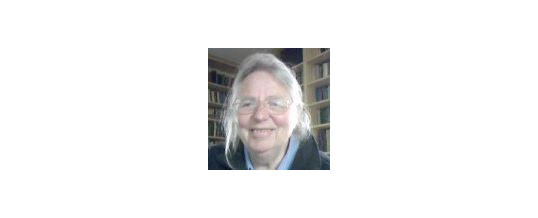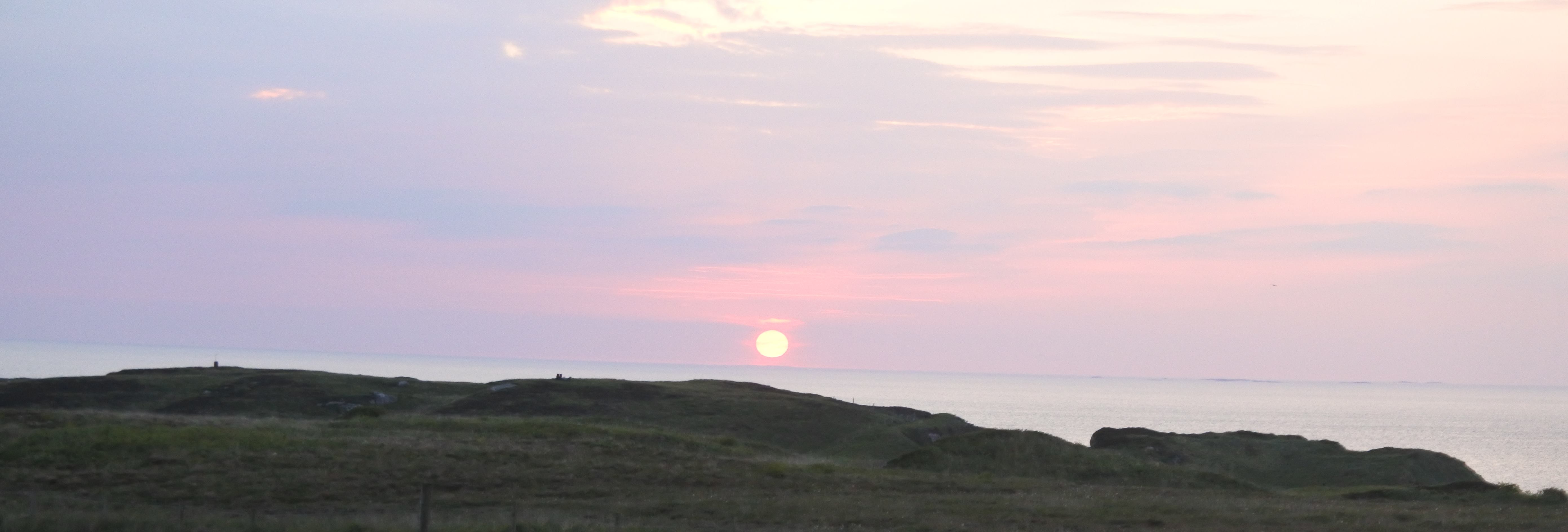
Each month the Corncrake is going to invite someone with Colonsay connections to give us an insight into who they are and why they’re here.
First up, after a bit of persuasion, is Angela Skrimshire.
Most of my life before Colonsay was spent in the south of England. I’ve lived here only in retirement, and never had to make a living on the island. As the late Findlay MacFadyen once wisely told me (though not in these exact words) , “you can learn the language but you won’t ever truly understand the way people here think and live because they have had a whole other way of life.” That has to be true for anyone not born into the culture of the Gàidhealtachd. I’m writing as an English incomer.
How long have you lived on Colonsay?
Since January 1996. So it’s eighteen years now.
What brought you here in the first place?
I came on holiday with friends for a week in the 1980s, loved it, and came again in summer 1995 when approaching retirement. I stayed at Seaview and Annie’s wee studio was available at very reasonable rates and so on impulse I decided to take it from January to June, just because it’s such a beautiful island, and ‘why not?’. I am grateful to Annie and Bill, and so lucky to have had the freedom to come.
Why have you stayed here?
After a few months of walking and cycling all over the island and getting to know so many special people and places, I didn’t want to leave. Alex Howard leased me Sgreadan Cottage before it was renovated, for four years at acceptable rates, for which again I was grateful and fortunate. So I went south for the summer, let the house and returned in the autumn.
I loved Sgreadan Cottage, it is a house with a significant history and a peaceful and generous feeling. At that time it still had a small piece of fertile garden that had been worked for generations, within the remains of its original dyke. I adopted a cat and a dog, and found kind and helpful neighbours in Kilchattan, some of whom have now moved or sadly passed away, but others have come.
After a few years I was able, thanks to Duncan, to buy a plot on his croft, build here, sell the house in England, and commit to becoming a permanent resident with no mainland bolt-hole and no easy way back. There had been time to learn about island life, and take the decision with open eyes.
Colonsay is regarded by many of its residents and visitors as a very special place. What makes the island special to you?
For me it’s “special” both as a physical place, and as a community of people:
As a place, it is so much more than a succession of beautiful landscapes and seascapes for happy seaside holidays, though all that is good too, of course. More unusually, it contains in a small space a multiplicity of habitats, both natural and man-made, that by a mixture of design and neglect have survived relatively undamaged.
It’s miraculous to see from one’s own window harriers, ravens and choughs, Greenland white-fronted geese, or red throated divers, or to be dogged by the squawk of a corncrake! And it’s not just about species declining elsewhere, but the abundance of more common ones, and the wide variety of easily accessible habitats. It’s the same for plants – being shown or just finding, rare ones, and the delight of the displays of meadow, marsh and moorland plants that were once common and here still are.
Not only does this natural profusion still exist, but you can see it in clear unpolluted air, and a dramatic variety of weather conditions, while you can walk nearly everywhere on the island, apart from the in-bye land, on unmade tracks and sheep paths, uncluttered by intrusive “tourist trails”.
Every road and the view from nearly every hilltop leads to the sea, with all its lights and movements, smells and sounds, and another whole population of plants and living creatures.
Above all you can usually enjoy it in quietness and natural sound. I deeply value the stillness and peace of Colonsay at all times, but particularly on windless summer evenings. The other rare phenomenon here is the absence of light pollution in less populous parts of the island. Places like Coll have made a marketing feature of their “dark skies”. Here it is yet another precious and perhaps underrated asset – the brilliance of the stars, the good opportunities to see noctilucent clouds and the northern lights, or simply a full moon reflected in Loch Fada, in stillness of water and air.
But though the island has wild places, it has been lived on and worked for millennia, and never yet entirely depopulated. The community is an integral part of Colonsay’s “specialness”.
I have met such special people: clever, cultured, multi-skilled and resilient, full of humour, but deeply intuitive, generous and kind. Their friendship has been a great privilege.
There is an unusual quality of maturity and courtesy in the old island culture, people have been extraordinarily accepting, they have helped me feel comfortable staying here.
When there is a real need for help the community rallies to provide it. The local medical and caring staff are dedicated and very professional, as are the impressive volunteer fire crew and coastguards. Our faithful, honourable postman and our capable young shopkeeper constantly go the extra mile for us all. And many in the incoming community from the mainland bring significant resources and skills to the island, and have made very generous efforts to support island life, while respecting community traditions.
Then there is the rich traditional culture of language, music and song. Though Gàidhlig is dying out here, the musical and literary culture is still very much alive.
Overall, living here has been a stimulating and profitable experience, there is so much to learn and do: “Being able to see new places and learn new things every day”, as Liam said in his moving contribution last month.
Is there anything that you feel needs changed on the island?
As in any community there are of course serious difficulties, but it is doubtful that many of them can be changed.
Structurally, there is the almost total dependence for infrastructure and public welfare on mainland institutions and resources, both of government and of national, even global, private enterprises. In this it is probably little different from any other modern rural community. But there is also the fact of having been and partly still being an island estate, with the sometimes bitter historical legacy that that entails.
As in any community there are subterranean manœuvres to promote business, family or individual interests, together with all the ordinary difficulties and dissensions among people everywhere. Naturally newer and more traditional ways and cultures diverge. Even the survival of the intense and supportive family loyalty of an older society, integral to the identity of those born into it, has a dark side.
But such things are not going to be fundamentally changed – “community” is a cosy buzzword that can be used in many ways. “Community” schemes and “community” ownerships often become channels for handling ongoing shifts in local power and influence among existing business and individual interests, both used by them and used to mitigate their effects.
It would be good if the Council could afford to have all the roads re-surfaced … And current plans for improved broadband speeds, if provided reliably, might encourage small business.
But the big challenge is to maintain the population size and workable age distribution. On the one hand, changes which imperil the essential “specialness” of the island would undermine its value in the tourist market, as well as destroying something of inestimable intrinsic worth. Yet there needs to be some way of making life possible for the kind of younger people who would both value that “specialness” and have the skills and resources to be able to make a living here.
Existing job or business opportunities might be filled or retained if there were a few more affordable housing units, as are now being considered. But otherwise as we all know it is hard to fund and sustain new job opportunities in professions and businesses that would not change the island in unwanted ways
It seems that the speculative building of holiday accommodation for letting or sporadic “second home” occupation has long over-stretched the island’s capacity to support and benefit from it, and needs to be reconsidered. It becomes a strain on the infrastructure, and for years now has used mainland companies to provide most of the skills and labour.
I once wondered whether with the cooperation of some of the conservation organisations and the SFSA it might be possible to set up a Field Studies Centre, staffed long term by skilled field workers and teachers with backgrounds in the natural sciences, with additional full- and part-time support staff. I can only hope that one day someone younger and more enterprising could take up the idea and run with it.
Is there anything that you think needs special protection?
Yes. An off-the-cuff list might include: the machair, the flowering roadside verges (sorry!), the woodlands, both the ‘old’ woods on the east coast, with their populations of rare plants and insects, and the ageing gale-battered policy woods whose shelter belts of larch and conifer are succumbing and not replanted, the lochs, the aquatic plants and the fish, the birds, lizards, slow worms, bats, shrews, as well as the otters and seals, and the marine environment that surrounds and sustains the island. Hopefully the funding of existing protective schemes will be maintained.
It is important that whole habitats and ecosystems are protected, not just the rare species. Colonsay people on the whole care about and for their environment. Yet a belief persists that because these “special” assets of Colonsay have always been here, they always will be, even though elsewhere it is clear how fragile such environments are and how quickly they disappear.
What is your favourite place on the island?
No answer supplied
Share a special Colonsay memory with the Corncrake.
No answer supplied
If you were the absolute ruler of Colonsay what one law would you pass above all others?
No answer supplied
Thanks Angela – who is next – send us a suggestion – or make an offer – we want to hear from you – contact details at the end
You May Also Like...
Recent Posts

The Front Page – July 2018
Though the not-quite-a-drought time eventually ended, summer did not part, as it might have done,...

The Front Page – June 2018
The warm dry spell that spread across the whole country in late spring and extended...

The Front Page – May 2018
Spring came late this year, but by May calving and lambing were well underway on...
